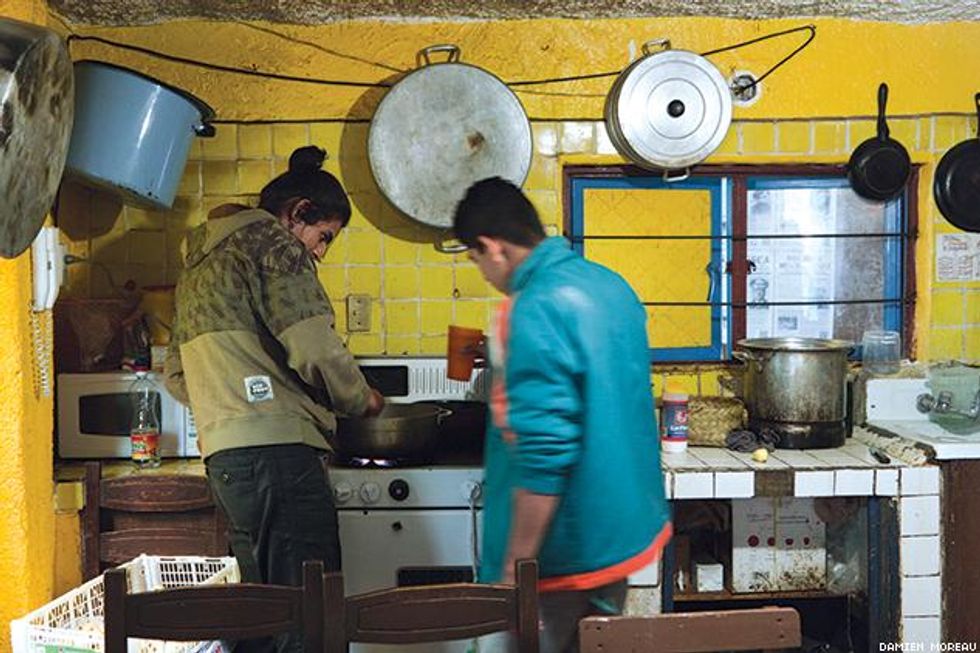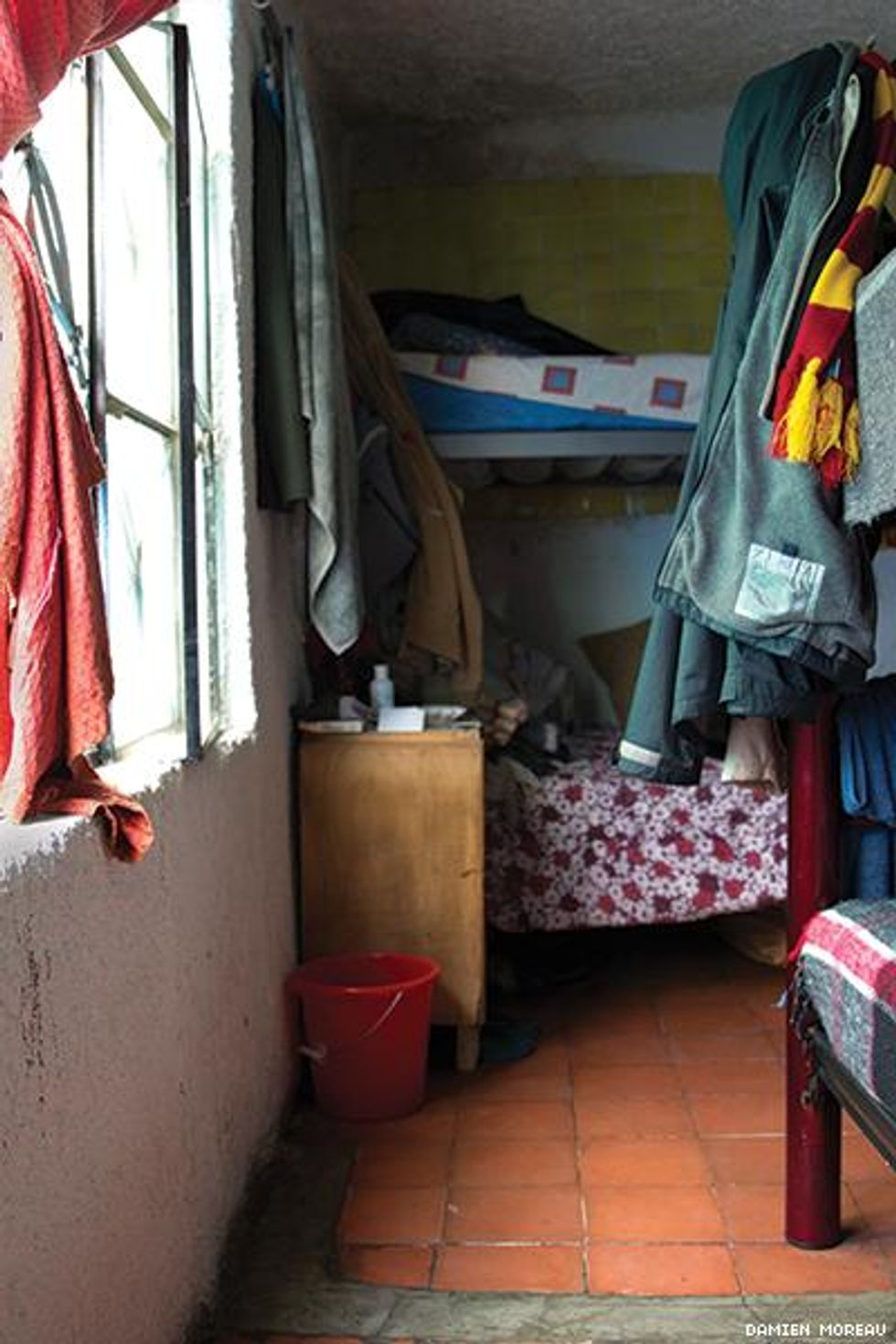 Jessica Noemi Coro Lorenzana prepares the afternoon meal for her fellow resident immigrants at Casa Tochan.
Jessica Noemi Coro Lorenzana prepares the afternoon meal for her fellow resident immigrants at Casa Tochan.
Last year President Barack Obama chose November 20, which is also Transgender Day of Remembrance, to announce his executive action that overhauled U.S. immigration policy. Despite the coincidence, the changes the president put into action didn't provide much cheer for LGBT immigrants.
Obama extended protection from deportation to roughly 3.7 million immigrants. But most of the guarantees were reserved for people whose legally recognized spouses, children, or parents were already American citizens. This was small comfort for LGBT folk whose partners are often not legally recognized, are estranged from family members, and for whom giving birth to a child in the traditional manner is often out of reach.
"It was bittersweet because this has been the biggest win in the immigrant rights sector for many, many years," said Jorge Gutierrez, national coordinator for Familia: Trans Queer Liberation Movement (the United States' sole organization focused on serving the LGBT Latino population.) Gutierrez, whose organization stages civil disobedience actions at detention centers calling for the release of all queer immigrants, expressed concern that Obama's order would leave undocumented LGBT immigrants even more vulnerable. "Many [LGBT immigrants] still see the U.S.A. as a mecca for freedom," Gutierrez said. "But they are faced with a completely different reality once they are here and find themselves fighting the criminal and immigration systems that are both transphobic and racist."
For many queer people, the United States still represents a place where they can be themselves with less fear of persecution and violence. The University of California at Los Angeles's Williams Institute estimates that of the 11 million undocumented immigrants in the United States, more than 267,000 identify as lesbian, gay, bisexual, or transgender. The journey to the United States is brutal, particularly for would-be immigrants coming from Mexico or Central America. Gangs in Mexico earn revenue by preying on vulnerable transitory people, and crossing the U.S. border illegally can entail a dangerous ride in a coyote's truck or a long trek on foot across the desert. Still, they come. Many are turned back, and still they come again. Their stories make the risk-taking understandable.
 In a Mexico City immigrant shelter, Jessica Noemi Coro Lorenzana is considering another run at a life in the United States. Lorenzana, who was born in Guatemala, realized she was transgender at just 8 or 9 years old, and was only 7 when she had her first sexual encounter with a boy. She voluntarily broke the news to her family that she was attracted to men, expecting them to find the news difficult, but tolerable. She was wrong. "My dad told me if I wanted to keep living in the house," Lorenzana said, "I had to 'act like a man.' For me, that was something I would never be able to do. He said, 'Well sorry, but you'll never set foot in this home again.' " With 2 million quetzals (roughly $260) that her parents had given her, 7-year-old Lorenzana conspired with a bus driver to cross the border into El Salvador illegally. Her life as a queer nomad had begun. She made her way to Santa Ana, the country's second largest city, and started living on the streets.
In a Mexico City immigrant shelter, Jessica Noemi Coro Lorenzana is considering another run at a life in the United States. Lorenzana, who was born in Guatemala, realized she was transgender at just 8 or 9 years old, and was only 7 when she had her first sexual encounter with a boy. She voluntarily broke the news to her family that she was attracted to men, expecting them to find the news difficult, but tolerable. She was wrong. "My dad told me if I wanted to keep living in the house," Lorenzana said, "I had to 'act like a man.' For me, that was something I would never be able to do. He said, 'Well sorry, but you'll never set foot in this home again.' " With 2 million quetzals (roughly $260) that her parents had given her, 7-year-old Lorenzana conspired with a bus driver to cross the border into El Salvador illegally. Her life as a queer nomad had begun. She made her way to Santa Ana, the country's second largest city, and started living on the streets.
For the next eight years, Lorenzana sold bread rolls on the street, slept in an abandoned building with other homeless youth, and sniffed glue out of paper bags to forget the hurt that her parents' rejection had carved into her. When she was 15, she could no longer afford to pay the ever-rising cut that the local chapter of the notorious Mara Salvatrucha transnational gang demanded of her bread sales, and gang members came to her squat, striking her with bricks and nearly throwing her out of a fourth floor window. After a run-in with homophobic police officers that landed her in juvenile detention, Lorenzana went back to Guatemala, to the town of Poptun, to live with an aunt.
Right: Immigrants share close quarters inside the dormitory at Casa Tochan.
 Jessica Noemi Coro Lorenzana in the garden at Casa Tochan
Jessica Noemi Coro Lorenzana in the garden at Casa Tochan.
"I thought about making my life in Guatemala, but I couldn't do it," she said. The physical threats she had to endure as a trans woman were intense. She felt her mental health slipping away and got into therapy. "At one point," she said, "I started thinking the world was against me." One day, three men in ski masks approached her on a back road and started shooting. Weeks later, after she got out of the hospital, she stowed away on a cargo train that would take her to Mexico. Her reason for leaving is terrifying: She thought her father sent the men to kill her. She still has three bullets lodged in her body from the incident.
Lisa's story is no less heartbreaking. (Lisa is not her real name, and all identifying details have been changed because her case is pending review in U.S. immigration court.) In her teens, her school peers noticed Lisa's feminine walk and labeled her a "maricon," which roughly translates to "f****t." The taunts increased and became violent as Lisa got older, but that didn't stop her from getting a position with an organization that helped fellow trans women. Her anti-violence work left her the target of death threats from gang members. At age 22, she took a single suitcase and left for the United States.
If you were to board one of the luxe, air-conditioned buses that traverse Mexico, the journey would take three days from the country's southern border with Guatemala to its northern one with the United States. But for a poverty-stricken refugee, the journey can stretch into weeks, even months. Lisa slept in parks and picked up odd jobs so she could afford a bus to the next small town. Then she was kidnapped by a person promising to help her. She was given two choices: become a prostitute or have her organs harvested for profit. Although she wouldn't reveal the details because of her asylum case, she said she narrowly escaped.
Lorenzana took cargo trains through Mexico, along the way meeting friends who provided company on the final, brutal eight-day walk through the desert and into Arizona. When they finally made it to Tucson, she had no money, but she was free. She found shelters that would give her a bed for the night, food, and medicine. She met other queer people in a city park.
"I felt good," she remembered. "Instead of discriminating against me, people helped me. They understood me. Those days were perfect." Three months into her life in the United States, immigration officials detained her while she was walking down the street one afternoon. After 12 days in a detention center, she was on a plane to Guatemala. Twenty-four hours later, she was back on the road to Mexico. She was terrified to be in her country of birth any longer.
Lisa took a different approach to get into the United States, going straight to the officials at the Mexican-American border and asking for asylum, an option that is available to immigrants who can prove they have "credible fear," of being in their home country. For her honesty, she was rewarded with six months in a detention center, during which her gender identity (her reason for asylum) was questioned in interrogation.
These detention centers can be hellish for LGBT immigrants. Many queer people are considered as "at risk" and are relegated to solitary confinement. They make up a disproportionate amount of sexual assault victims. The Center for American Progress has found that LGBT immigrants are 15 times more likely to be sexually assaulted in detention. Trans women -- often housed in the all-male wards -- make up 0.2% of all detained immigrants in the United States, but the Government Accountability Office found they make up a staggering 20% of the confirmed sexual assaults in detention facilities.
In October 2014, a Guatemalan trans woman named Nicoll Hernandez Polanco came to the United States seeking asylum. She was put in the male ward of a facility in Florence, Ariz., and has been subjected to sexual groping by guards, who repeatedly called her "the woman with balls." After physical threats from fellow inmates, Polanco is now refusing to leave her cell, and advocacy groups like Mariposas de la Frontera and the Transgender Law Center are demanding she be released.
 A painted map of Mexico in the garden for residents to familiarize themselves with their new country
A painted map of Mexico in the garden for residents to familiarize themselves with their new country.
 A diagram above the communal computer highlighting basic points on gender violence
A diagram above the communal computer highlighting basic points on gender violence.
The Center for American Progress found that queer immigrants in detention with no professional counsel stand a 3% chance of being granted asylum. There is no right to an attorney in immigration proceedings, so linking with an advocacy organization can often be the only means of salvation for LGBT immigrants. Lawyer Jason Ortega of Equal Justice Works caught wind of Lisa's situation and was able to arrange a transfer for the 23-year-old to a Los Angeles shelter for homeless LGBT youth. Lisa is still awaiting her hearing that will decide her asylum status. She'll probably be waiting a few years -- the immigration courts are inundated with such cases. To her, it's worth it. "It's beautiful to see two people of the same gender holding hands and walking down the street," she said. "In Central America you don't see that. At home, they would kill you."
After her failed bid for life in the United States, Lorenzana found a home in Mexicali, Mexico, and spent six years working illegal odd jobs -- maintenance work in a baseball stadium, a gig at a cell phone battery factory. She found love, living with a man for two years before his worsening drug addiction left her fearing for her physical safety. Then she rode a bus that was stopped by the police. They asked for her papers. She was shipped back to Guatemala. This time, she decided to seek official refugee status in Mexico, but she lacked any documentation of her persecution and injuries and was denied in December.
She nonetheless went to Mexico City, where at least there are LGBT anti-discrimination laws. Some friends introduced her to Julio Campos Cubias, a gay man who had emigrated from El Salvador two years earlier and started Migrantes LGBT, an advocacy organization that offers resources for queer immigrants in Mexico. Cubias got her a bed in Casa Tochan, a halfway house for Central American immigrants in the Tacubaya neighborhood, where Lorenzana currently resides. Casa Tochan provides beds, food, group therapy with psychology students from the National Autonomous University of Mexico, and educational programming that includes workshops on legal rights and English classes.
Mexico City often becomes the de facto landing pad for queer Central American immigrants -- the massive capital provides not just legal safety, but also support organizations, including Puertas Abiertas, an LGBT church that reaches out to immigrants and other vulnerable queer populations. "We try to find ways to help [LGBT] immigrants," says Octavio Parra, the gay pastor at Puertas. "Living with God has given me peace, and that's what we want for them."
Lorenzana has a decision to make. She can get a regular job at a factory (albeit illegally) that will cover the cost of reapplying for asylum in Mexico, or she can try once again for the United States. Vicky Lopez Fernandez and Mariana Hidalgo Costas, authors of a forthcoming manual of best practices for Mexican immigrant shelters who serve queer migrants, said: "On many occasions, [LGBT immigrants] construct the United States in their imaginations in this idealized way, as the country where they can work, make a living, without being judged or raped on the street due to their expressions of gender."
Lorenzana said she has a friend who has a friend who knows the border well, so maybe it won't be as rough this time. When asked about her goals for the future, her answer was simple. First, respect. Then a house, and a partner "who I understand and who understands me."
In the meantime, Mexico City provides some opportunities for her to be herself -- and a chance to set aside weighty concerns, at least for a moment. She glowed as she talked about her New Year's festivities and the denim mini-skirt she wore despite friends' protests that it was too cold out. "I had a lot of admirers that night," she said with a grin.


 Jessica Noemi Coro Lorenzana prepares the afternoon meal for her fellow resident immigrants at Casa Tochan.
Jessica Noemi Coro Lorenzana prepares the afternoon meal for her fellow resident immigrants at Casa Tochan. In a Mexico City immigrant shelter, Jessica Noemi Coro Lorenzana is considering another run at a life in the United States. Lorenzana, who was born in Guatemala, realized she was transgender at just 8 or 9 years old, and was only 7 when she had her first sexual encounter with a boy. She voluntarily broke the news to her family that she was attracted to men, expecting them to find the news difficult, but tolerable. She was wrong. "My dad told me if I wanted to keep living in the house," Lorenzana said, "I had to 'act like a man.' For me, that was something I would never be able to do. He said, 'Well sorry, but you'll never set foot in this home again.' " With 2 million quetzals (roughly $260) that her parents had given her, 7-year-old Lorenzana conspired with a bus driver to cross the border into El Salvador illegally. Her life as a queer nomad had begun. She made her way to Santa Ana, the country's second largest city, and started living on the streets.
In a Mexico City immigrant shelter, Jessica Noemi Coro Lorenzana is considering another run at a life in the United States. Lorenzana, who was born in Guatemala, realized she was transgender at just 8 or 9 years old, and was only 7 when she had her first sexual encounter with a boy. She voluntarily broke the news to her family that she was attracted to men, expecting them to find the news difficult, but tolerable. She was wrong. "My dad told me if I wanted to keep living in the house," Lorenzana said, "I had to 'act like a man.' For me, that was something I would never be able to do. He said, 'Well sorry, but you'll never set foot in this home again.' " With 2 million quetzals (roughly $260) that her parents had given her, 7-year-old Lorenzana conspired with a bus driver to cross the border into El Salvador illegally. Her life as a queer nomad had begun. She made her way to Santa Ana, the country's second largest city, and started living on the streets. Jessica Noemi Coro Lorenzana in the garden at Casa Tochan.
Jessica Noemi Coro Lorenzana in the garden at Casa Tochan. A painted map of Mexico in the garden for residents to familiarize themselves with their new country.
A painted map of Mexico in the garden for residents to familiarize themselves with their new country. A diagram above the communal computer highlighting basic points on gender violence.
A diagram above the communal computer highlighting basic points on gender violence.

































































Charlie Kirk DID say stoning gay people was the 'perfect law' — and these other heinous quotes